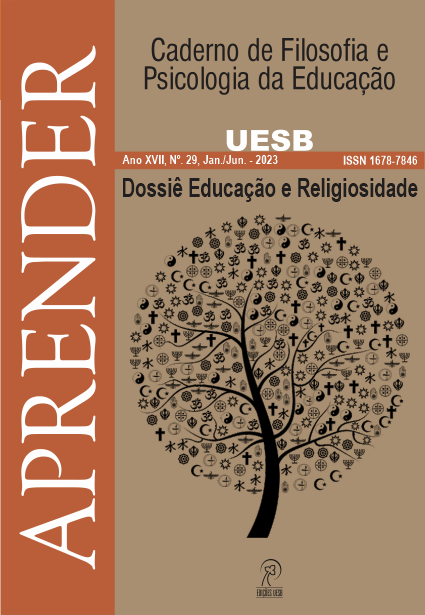TRAINING DIMENSIONS IN AFRO-BRAZILIAN MATRIX TERRITORIES: NOTES OF A “RESEARCHER - ABIAN”
DOI:
https://doi.org/10.22481/aprender.i29.12347Keywords:
formative dimensions, traditional Afro-Brazilian community, teaching, learningAbstract
This paper portrays the results of a research carried out along the lines of participant observation and ethnobiography with the aim of understanding the dynamics between teaching and learning and the civilizing values inherent in the daily practices of a traditional Afro-Brazilian community. The study was carried out through the observation and participation of liturgical activities of a community of Umbanda and Candomblé - the "Ilè Asè Tobi Babá Olòrigbìn" - located in Ituiutaba, MG. Teaching as a shared responsibility, the reaffirmation of ethical/civilizing principles (such as circularity, ancestry, corporality, conduct), the centrality of orality and the relationship between community life and a singularity that is based on the collective were aspects perceived as characteristics of a formative dimension that guides learning within this group. Considering that the model practiced by these communities is a successful model (which has withstood time and a history of oppression), we highlight the great challenge of learning from the teachings of Afro-Brazilian territories and finding ways to incorporate them into our educational practices, so that we can envision a more diverse and humanized school.
Downloads
References
ABIB, Pedro Rodolpho Jungers; CORDEIRO, Albert Alan Sousa. A Educação da Capoeira: uma pedagogia da Cultura Popular/The Education of Capoeira: a popular culture pedagogy. Educação em Foco, v. 21, n. 33, p. 223-241, 2018.
ANGROSINO, Michael. Etnografia e observação participante: coleção pesquisa qualitativa. Bookman Editora, 2009.
BÂ, Amadou Hampâté. Amkoullel, o menino fula. Tradução de Xina Smith de Vasconcellos. São Paulo: Palas Athena: Casa das Áfricas, 2003.
BARROS, Daniela; PEQUENO, Saulo; PEDERIVA, Patrícia Lima Martins. Educação pela tradição oral de matriz Africana no Brasil: Ancestralidade, resistência e constituição humana. Archivos Analíticos de Políticas Educativas, v. 26, n. 1, p. 82, 2018.
COSTA, Aline Guerra et al. Dimensões formativas decorrentes da congada em Lambari/MG: entre experiência, saberes e ancestralidade. Devir Educação, p. 57-84, 2020.
GRUPO OFÁ. Obatalá: uma homenagem a Mãe Carmem. Rio de Janeiro: Gegê Produções Artísticas, 2019.
KIMURA, Verônica; MENDES, Geovana Mendonça Lunardi. Atravessando os portões: educação nos terreiros ou o que a escola poderia aprender. Práxis Educacional, v. 17, n. 46, p. 1-15, 2021.
OLIVEIRA, Gilmar Araujo; JUNIOR, Luiz Gonçalves; LEMOS, Fábio Ricardo Mizuno. Processos educativos desvelados na roda de capoeira da Associação Pena de Ouro. MOTRICIDADES: Revista da Sociedade de Pesquisa Qualitativa em Motricidade Humana, v. 2, n. 3, p. 177-189, 2018.
ROCHA, R. M. C. (2011). A Pedagogia da Tradição: As dimensões do ensinar e do aprender no cotidiano das comunidades afro-brasileiras. XI Congresso Luso Afro Brasileiro de Ciências Sociais –UFBA. Salvador.
SILVA, Haldaci Regina. Sabores da casa: práticas educativas e construção de saberes em um terreiro de umbanda de Teresina–Piauí. Universidade Federal da Paraíba. Temas em Educação, v. 24, n. 2, p. 74, 2015.
SOCIEDADE CULTURAL E RELIGIOSA ILÈ ALAKETU ÀSE BÀBÁ ÒLÒRÌGBÌN. Estatuto da Sociedade Cultural e Religiosa Ilè Alaketu Àse Bàbá Òlòrìgbìn. Ituiutaba: Documento de arquivo contábil, 2013.
SOUZA, R. M. O. (Texto revista/magazine) Iaô. Principio e fine ditutto. In Dialogo - Notiziario della Rete Radié Resch - Rubrica Religioni Afrobrasiliane, Quarrata (Pistoia) Itália, p. 123 - 124, 01 dez. 2011.
Downloads
Published
How to Cite
Issue
Section
License
Copyright (c) 2023 APRENDER - Caderno de Filosofia e Psicologia da Educação

This work is licensed under a Creative Commons Attribution-ShareAlike 4.0 International License.






